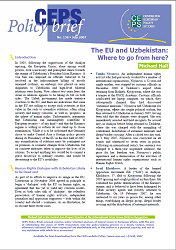№138. The EU and Uzbekistan: Where to go from here?
№138. The EU and Uzbekistan: Where to go from here?
Author(s): Michael Hall
Subject(s): Politics, Government/Political systems, International relations/trade, Security and defense, Developing nations
Published by: CEPS Centre for European Policy Studies
Keywords: EU; Uzbekistan; Karimov; Uzbek regime;
Summary/Abstract: In 2005, following the suppression of the Andijon uprising, the European Union, alone among world powers, took a necessary and principled stance towards the regime of Uzbekistan’s President Islom Karimov. A visa ban was imposed on officials believed to be involved in the indiscriminate killing of mostly unarmed civilians, an embargo was placed on arms shipments to Uzbekistan and high-level bilateral relations were frozen. Now, almost two years later, the strain in relations appears to be taking its toll on both sides. The Uzbek government has made tentative overtures to the EU, and there are indications that some in the EU are willing to accept such overtures at face value in the rush to normalise relations, often citing security and energy concerns, as well as ‘progress’ in the sphere of human rights. Unfortunately, arguments that Uzbekistan can meaningfully contribute to European security – of any kind – and that the Karimov regime is willing to reform do not stand up to closer examination. While it is to be welcomed that Germany chose to make Central Asia a foreign policy priority during its Presidency of the EU in the first half of 2007, any normalisation of relations must be contingent not on promises or cosmetic changes from Uzbekistan, but on concrete measures taken to improve the lives of its citizens. To accept anything less would be to commit a grave disservice to ordinary citizens, and would be devastating to the EU’s credibility.
Series: CEPS Policy Briefs
- Page Count: 7
- Publication Year: 2007
- Language: English
- Content File-PDF

